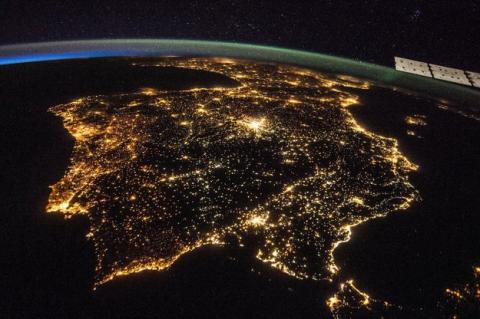Request lecture
Light pollution is not only stealing the starry sky from us in a continuous and silent way, but it is also altering the ecological balance of living beings and affecting people's health. The excess of night lighting contributes to the environmental collapse in which our planet is immersed. Time is running out, and it's time to stop excess artificial light at night, as lit areas are growing at a rate of 2.2% per year worldwide. What can we do to recover the night without damaging human well-being? Can light at night cause disease? White or yellow light? Does more light always mean more safety?
Brief CV
Enric Marco has a degree and a PhD in Physics from the University of Valencia. He has spent long periods at the Instituto de Astrofísica de Canarias in La Laguna (Tenerife) and at the Kiepenheuer Institut für Sonnenphysik (Kiepenheuer Institute of Solar Physics) in Freiburg (Germany). He has been a professor of Astronomy and Computer Science in the Department of Astronomy and Astrophysics of the Faculty of Physics of the University of Valencia. He is currently a senior technician in Astronomy in the Faculty of Physics and is in charge of the Astronomy Classroom at the University of Valencia, a laboratory dedicated to the teaching and dissemination of this science.
His main field of research has been directed to the study of the magnetic activity of the Sun. He currently collaborates with the team at the University of Valencia that has designed instruments for Solar Orbiter, the solar mission of the European Space Agency. His other field of work is the study of light pollution and its effect on astronomical observation and the environment. It is part of Salvem la nit, the Light Pollution working group of the University of Valencia, integrated in the Spanish Network of Studies on Light Pollution. Activist against the excesses in night lighting that have stolen our stars, he is currently president of Cel Fosc, an association against light pollution.
He has two books published, in collaboration with other astronomers, Astronomia Fonamental and A la Lluna de València: 10 biografies d'astrònom a astrònom and numerous dissemination articles in newspapers and magazines.
Convinced that science must not only be produced but also transmitted to society, he has made a significant effort to disseminate it. He has given numerous lectures and carried out astronomical observation sessions at outreach conferences and in teaching centers. Since 2005, he has been writing on his internet blog dedicated to astronomy, Pols d’estels. He is also vice-president of the Safor Astronomical Group.
More information
- Pols d'estels
- Salvem la nit
- Cel fosc
- Astronomia fonamental
- No es redueix la contaminació lluminosa posant més llums
- No existeix la il·luminació nadalenca sostenible
Social networks
- @EnricMarcoSoler
- @celfosc
- @FacFisicaUV
- @CdCienciaUV
- @MednightGTS
Request lecture

Stimulating scientific vocations is a project of the Scientific Culture and Innovation Unit of the University of Valencia, which has co-funding from the Spanish Foundation for Science and Technology and the Ministry of Science and Innovation.











